Le Quattro Volte Blu-ray Movie
HomeLe Quattro Volte Blu-ray Movie 
Kino Lorber | 2010 | 88 min | Not rated | Sep 13, 2011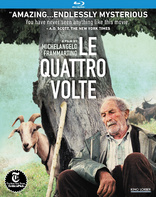
Movie rating
7.4 | / 10 |
Blu-ray rating
| Users | 4.0 | |
| Reviewer | 4.0 | |
| Overall | 4.0 |
Overview
Le Quattro Volte (2010)
An old shepherd lives his last days in a quiet medieval village perched high on the hills of Calabria, at the southernmost tip of Italy. He herds goats under skies that most villagers have deserted long ago. He is sick, and believes to find his medicine in the dust he collects on the church floor, which he drinks in his water every day.
Starring: Giuseppe Fuda, Bruno Timpano, Nazareno TimpanoDirector: Michelangelo Frammartino
| Drama | 100% |
Specifications
Video
Video codec: MPEG-4 AVC
Video resolution: 1080p
Aspect ratio: 1.85:1
Original aspect ratio: 1.85:1
Audio
Italian: Dolby TrueHD 5.1
Italian: Dolby TrueHD 2.0
Subtitles
None
Discs
25GB Blu-ray Disc
Single disc (1 BD)
Playback
Region A, B (C untested)
Review
Rating summary
| Movie | 4.0 | |
| Video | 4.0 | |
| Audio | 4.0 | |
| Extras | 0.5 | |
| Overall | 4.0 |
Le Quattro Volte Blu-ray Movie Review
You’ll either be enraptured, or this will be the longest 88-minutes of your life.
Reviewed by Casey Broadwater September 14, 2011Part movie, part meditation tool, Italian director Michelangelo Frammartino’s droll and elegiac Le Quattro Volte lulls you into a kind of
pleasantly reflective trance. The film is based on ancient mathematician and mystic Pythagoras’ belief in the transmigration of souls through four
phases—hence the title—human, animal, vegetable, and mineral. Almost the polar opposite of Gaspar Noé’s recent Enter the Void—a
breakneck reincarnation shocker shot from the point of view of a disembodied soul flying over Tokyo—Le Quattro Volte’s take on rebirth is
almost unspeakably serene, so serene, in fact, that there’s no dialogue in the film whatsoever.
Instead, Frammartino quietly observes his subjects—a goatherd, a goat, a pine tree, and a charcoal kiln—from a distance, with wide shots that are
surprisingly intimate and engaging. If, that is, you’re in the properly contemplative frame of mind. This is the kind of film that will either enrapture you
or bore you to distraction. It asks you to be quiet. It demands you pay attention and submerge yourself in its circadian rhythms. Resist and you’d be
better off checking your news feed on Facebook, but check into the right headspace and in you’re in for a beautiful, tranquil experience.
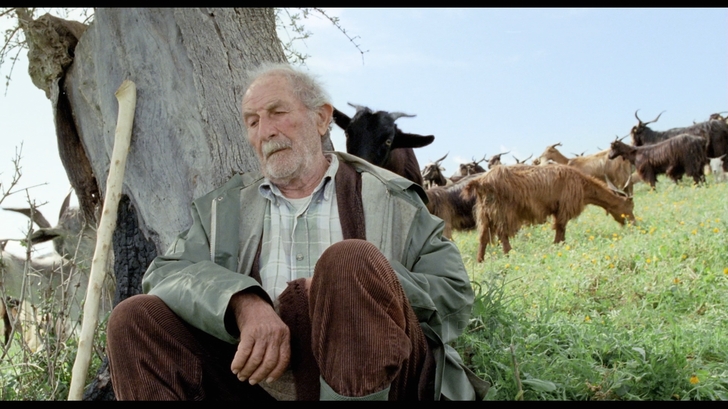
The setting is present-day Calabria, a rustic, timeless hilly region on the southern coast of Italy and, appropriately enough, Pythagoras’ old stomping grounds. In the first “phase” of the film we meet an elderly goatherd (Giuseppe Fuda) with a hacking cough who’s so weathered and craggy he almost looks like part of the surrounding landscape. We watch him go about his daily routine—walking the goats up the mountain in the morning, walking them back down again, and visiting the town’s Catholic church to collect a packet of dust from the custodian, who sweeps it up from the sanctuary and places it in makeshift envelopes made from the torn-out pages of glossy fashion magazines.
Each night, the old man spoons this dust into a glass of water, gives it a good stir, and drinks it down, a superstition-bound elixir of life. One day, he misplaces his packet of dust. The next morning, he dies. So it goes. At this very moment, a baby goat is born, and Frammartino shows us this miracle of life in all its wet, sticky glory, sliding out suddenly onto the cobblestone and hay. Its mother licks it clean. It bleats and struggles to stand up, it’s legs splayed and wobbly. Is this the goatherd, come back in a form that’s familiar to him? Is it a coincidence? Does it matter?
The film gradually ebbs and flows through a series of these life cycles. The baby goat grows and plays and eventually gets stuck in a ditch and separated from the herd; he wanders off across the mountain, beds down under an enormous pine, and the screen goes black, reemerging on a wintry scene with the tree covered in snow. We’re left to infer that the goat died, its essence and life-force transferred into the pine’s mighty trunk, which is ultimately cut down by the villagers and erected in the town’s piazza as part of some obscure local festival. Afterward, it’s chopped up and put inside a kind of earthen kiln, where it smolders and transforms into charcoal. Ashes to ashes, dust to dust.
This is what happens in the film, but Le Quattro Volte is more than the sum of its simple, cyclical “plot,” for the lack of a better word. Like Terrence Malick, Frammartino wonderfully conveys the magic, cruelty, and indifference of the natural world. He dwells on the landscapes and evokes the passage of time through the changing of seasons. He gives us lingering close-ups on the sage expressions of the goats, who stand about looking contemplative, chewing their cud. It’s about as close as you can get to “non-narrative” without becoming “pure” cinema, and at times it almost feels like a documentary, like Frammartino simply set up a camera at a distance and let real life unfold.
In one brilliant, nearly nine-minute sequence, the frame shows a Passion Play procession on a road outside of town, complete with men in centurion costumes and a stand-in Jesus toting a wooden cross. We get the allusion—death and resurrection—but Frammartino doesn’t let the scene get too serious; the goatherd’s dog comically interrupts the parade, barking and peeing and even causing an unmanned truck to careen down the street. The film is filled with this kind of dry, literally observational humor. The impression is that life—in all its forms—is both sad and funny, patterned and unpredictable, fleeting and eternal. No particular importance is given to human life; voices can be heard in the background at times, but they’re reduced to babble, as meaningless and incomprehensible as the bleating of the goats. Here, all things are one, coming and going, living and dying. I’ve not seen a simpler, quieter film this year.
Le Quattro Volte Blu-ray Movie, Video Quality 
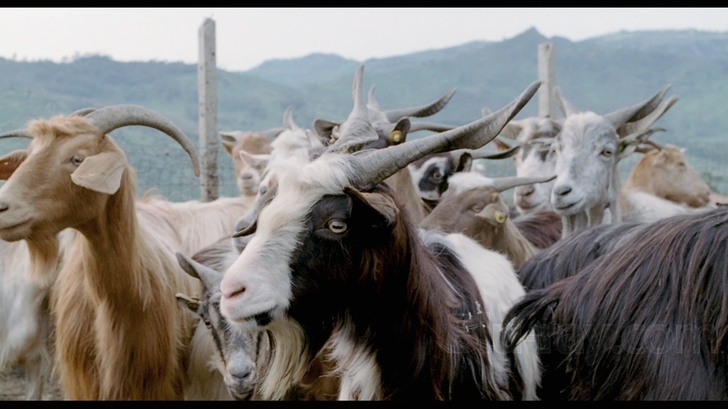
Kino-Lorber brings Le Quattro Volte to Blu-ray in the U.S. with a 1080p/AVC-encoded transfer that's strong but not quite perfect. For the most part, I was really impressed by the image here. Andrea Locatelli's cinematography is gorgeously natural—in keeping with the film's theme—and the Calabrian countryside has rarely looked so beautiful. The grain structure of the 35mm image is chunky at times—especially in darker sequences—and there are a few scenes that look to have been lightly cleaned up, and inevitably slightly softened, with digital noise reduction. The emphasis being on lightly and slightly. If it is DNR, it's been judiciously applied, as the picture never takes on the waxy, smeary, clay-faced quality you sometimes expect from a heavy-handed used of the process. Most of the film displays a strong degree of clarity. While longer shots—and there are many —can seem a bit soft, close-ups reveal lots of fine texture, especially in the old man's weather-wrinkled face and the shaggy hair of the goats. Color is realistic and dense, resting on a foundation of solid-but-never-oppressive blacks, and contrast looks good. You'll spot some compression noise—especially if you're watching on a larger screen—but nothing too distracting. Oddly enough, for such a recent film, I also spotted a few small specks on the print, but once again, it's no big deal. Overall, any small issues with the encode/transfer are easily overshadowed by the general beauty of the cinematography.
Le Quattro Volte Blu-ray Movie, Audio Quality 
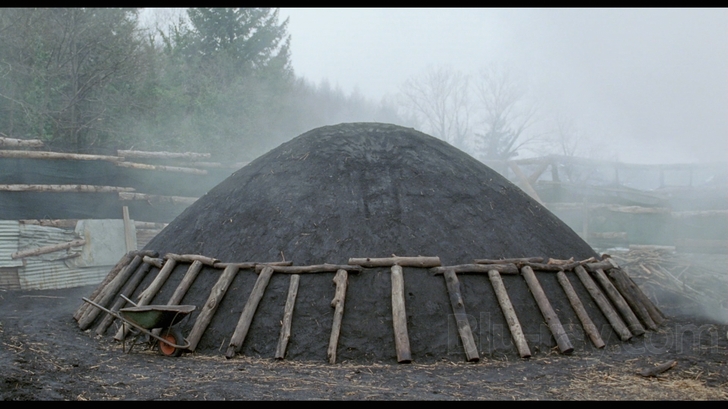
Yes, at the top of the page you'll notice it states that the disc includes an Italian Dolby TrueHD 5.1 surround track, but forget the Italian part—there is no discernable dialogue in the film whatsoever. You'll hear the distant clamor of villagers' voices from time to time, but not once are we ever intended to hear enough to be able to understand. So, we don't really need to address the clarity and balance of the vocals. There's also no score—there's no reason for one—so we can leave that out of the sound quality equation as well. Still, this is far from a silent film. Everything you hear in this mix falls under the large umbrella of "ambience." The bleating of goats and the atonal clanging of the brass bells around their necks. The bass-heavy rustle of wind and the tolling from a church tower. Festival din and the crackle of fire. The rear channels are only used quietly and sparsely, but the surrounds do figure prominently during the death/rebirth/fade-to-black scenes, where you'll hear dripping water behind your head and strange knocking noises. Everything sounds as rich and full as it ought to. The disc also includes an equally strong TrueHD 2.0 fold-down for those of you without surround systems. No subtitles options are given, or needed.
Le Quattro Volte Blu-ray Movie, Special Features and Extras 
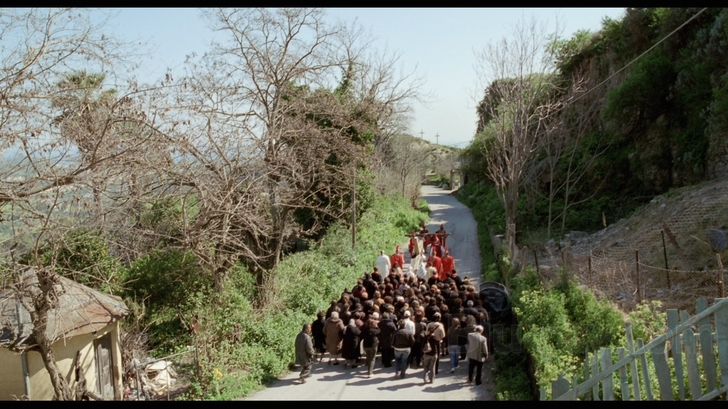
The only extras on the disc are a theatrical trailer (1080p, 2:07), a stills gallery with six high definition photos, and additional trailers for Yesterday, Today and Tomorrow (4:12), Sunflower (3:59), Marriage Italian Style (1:50), and Korkoro (2:04).
Le Quattro Volte Blu-ray Movie, Overall Score and Recommendation 
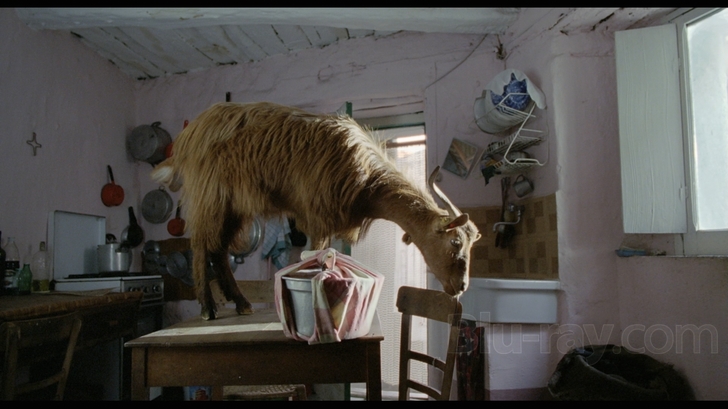
Le Quattro Volte is not for everyone, and even those who gravitate toward this kind of conceptual, almost non-narrative material will want to be in the right frame of mind—and in a quiet, distraction-free environment—to properly experience and enjoy it. But if you have the patience and the attention span there's a lot of simple truth and beauty to be found here. Personally, after reviewing the epic Star Wars box set earlier this week —which was loud and action-oriented and good in an entirely different way—I found Le Quattro Volte to be a much-needed change of pace. Recommended for anyone looking for a contemplative break after the mind-numbing non-stop spectacle of the summer blockbuster season.
Similar titles
Similar titles you might also like

Little Buddha
1993

Certain Women
2016

The Skin Game
1931

Ballast
2008

A Month in the Country
Limited Edition to 3000
1987

Minari
2020

Cemetery of Splendor
2015

George Washington
2000

Novitiate
2017

Europe '51
Europa '51 / The Greatest Love
1952

Stromboli
Stromboli, terra di Dio
1950

Death in Venice
Morte a Venezia
1971

Il Posto
1961

Somewhere
2010

Tom at the Farm
Tom à la ferme / English packaging / Version française
2013

The Fugitive Kind
1960

My Own Private Idaho
1991

City Girl
1930

Nebraska
2013

The Other Man
2009